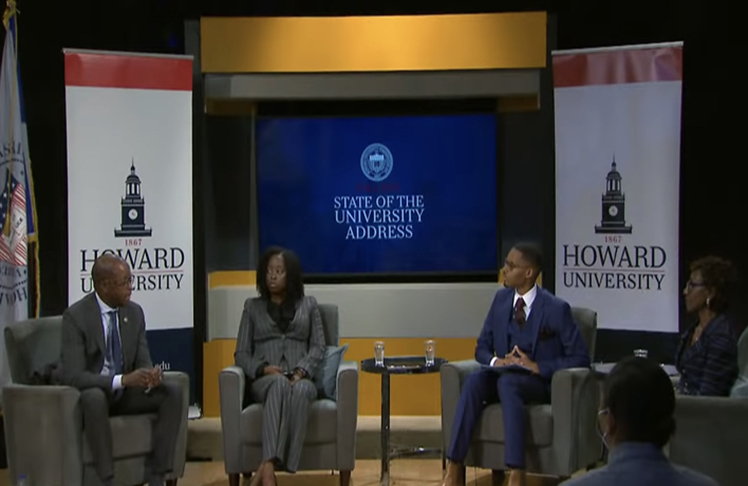
By India Bookhart, Howard University News Service
WASHINGTON — Amid a highly-publicized student protest, a stubborn coronavirus pandemic and on the heels of a hobbling ransomware attack, the president of one of the leading historically Black institutions, told the school’s students, alumni and parents that he and his administration are trying to address student complaints about mold and flooding in student housing and student representation on the Board of Trustees.
“I hear the concerns,” said Howard University President Dr. Wayne A. I. Frederick in his annual State of the University address via the university’s YouTube channel.
“I want to be absolutely clear about that, and I’m also empathic with the students. Whether one student had mold, in his/her room or if one student was affected by Wi-Fi, that’s more than enough. And certainly, we apologize for anyone who was inconvenienced in any shape or form.”
After citing achievements at the 12,000-plus student university – increases in graduation rates, the school’s largest first-year class in decades and increased enrollment in its medical schools — Frederick addressed a variety of complaints from students and alumni.
Student protestors took over the university’s Armour J. Blackburn Center, the university’s social hub, in mid-October to complain about the lack of student housing and the poor condition of existing housing, including accusations of buildings with mold and rats. They also cited the revocation of student positions on the university’s Board of Trustees
Public figures, including U.S. Reps. Cori Bush, D-Mo., Ayanna Pressley, D-Mass., Jamaal Bowman, D-N.Y., and civil rights leader the Rev. Jesse Jackson, have offered their support. Meanwhile news stories about the protests have been carried nationally, from CNN to NBC to ABC to the New York Times, the Washington Post, the Guardian to scores of the member publications of the National Newspaper Publishers Association.
Frederick has met with the student leaders, but they say they won’t end their protest until he agrees to a public forum open to all university students, which Frederick so far has refused to do.
Additionally, in early September, the university, which includes one of two of the nation’s Black medical schools, a law school and colleges of dentistry, pharmacy and nursing and allied health sciences, was hit by a ransomware attack that closed the university for a day and forced it to temporarily halt online classes and all Internet activity.
Students have complained many Internet services they need still are not available.
Frederick said he recognized problems with housing conditions, but also defended his administration’s efforts to provide adequate student dormitories.
“If one person had a mold problem, that’s one too many,” he said. “In the bigger scheme of things, of 2,700 rooms, the physical infrastructure of our residence halls today is as good as it’s ever been.”
Frederick said he believes lack of occupancy in dormitories due to the coronavirus pandemic the previous academic year, increased the possibility of mold in the buildings. This semester, there have been 41 reports of mold and one report of flooding in university’s dormitories, he said.
Frederick, who has headed the university since 2014, said his administration implemented the reconstruction and rebuilding of seven of eight dormitories on campus. He said these renovations have improved the physical structure of the buildings.
Frederick said he has personally been involved in supervising the dormitories’ readiness.
“We do something called summer readiness,” he said. “It involves inspecting all of the rooms. We’re looking at heating systems, cooling systems. In the residence halls, it does involve inspecting every single room.”
Frederick said when he inspected a women’s dormitory, the Harriett Tubman Quadrangle, he was surprised by the age of the dorms, the way the rooms were configured and how the courtyard wasn’t set up for use, so he undertook a plan to update the facility
During the question-and-answer session after Frederick’s address, one of the students and alumni present asked about the lack of student, faculty and alumni representation on the university’s Board of Trustees.
“The concern is losing that shared governance,” the questioner said.
The board removed students, faculty and alumni positions from their affiliate positions in June, saying the decision was made to bring the school in line with the standard practices at other universities.
Although there was a shift, Frederick said, students, alumni and faculty will still participate as voting members on the board but at a committee level. “My advice is to give the restructure an opportunity, see how it works and provide feedback,” he said.















